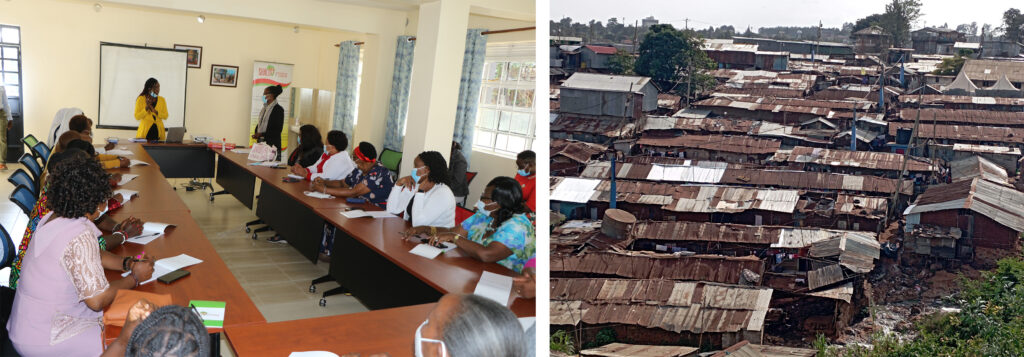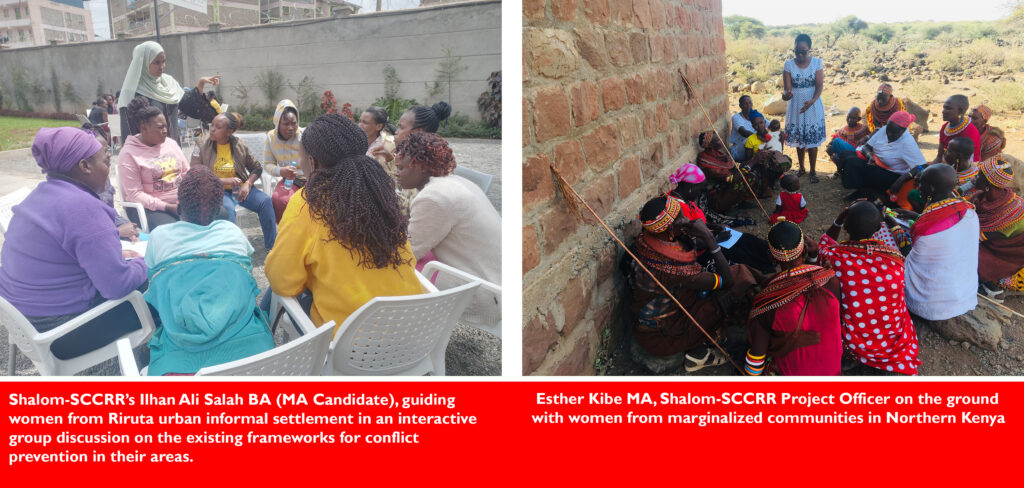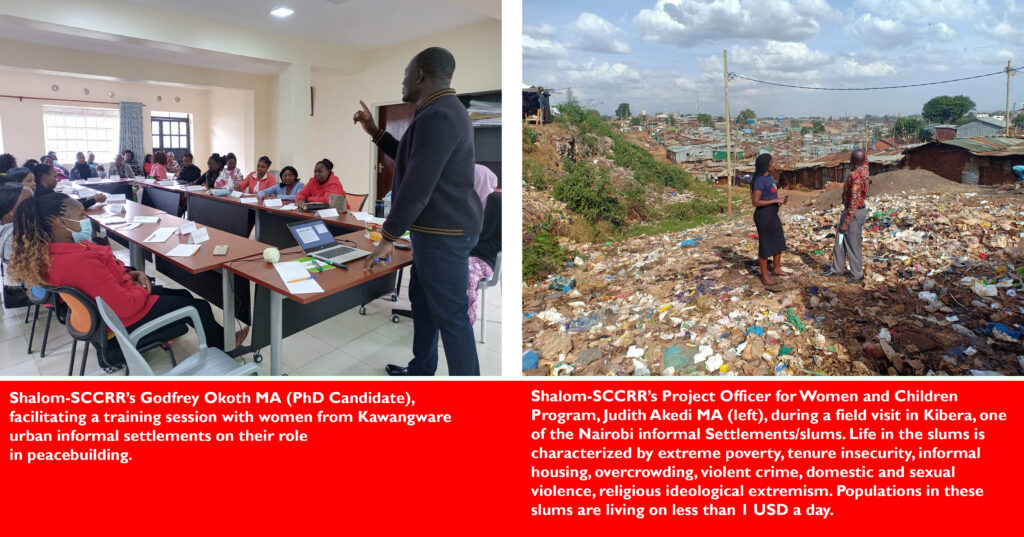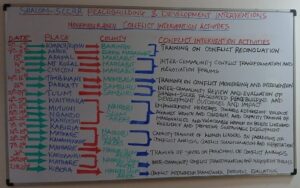By: Judith Akedi Otsieno MA,
Two-thirds of women in the urban informal settlements have been impacted by violence against women mainly in their families or communities: twice the global average. Marginalized, discriminated against and victims of physical and psychological violence, the situation of these women and girls is further aggravated by the difficulty of accessing formal justice and obtaining reparation. Contributing factors include limited knowledge of their rights; difficulty in accessing public services; improper conduct by security officers-police; personal fear – for example, of the perpetrator; and taboos and social traditions surrounding the issues. In most cases, violence against women is deeply rooted in systemic discrimination, including social and cultural norms that tolerate it and fail to provide support to women and to victims.
In Nairobi’s urban informal settlements – (Riruta; Waithaka; Dagoretti; Kibera; Mathare; Kariobangi; Korogocho; Kangemi; Mtego; Kawangware; and Huruma), as well as in marginalized conflict regions in the semiarid terrains where Kenya interfaces with Ethiopia, South Sudan and Uganda, violence against women and children is a complex social problem. Exposure to various forms of harm and living in fear prevents women from fully realizing their potentials, violates their rights and dignity, reduces their wellbeing, and also reducing their contribution to the development of society.

In the past thirteen months, the Shalom Empowerment Center (SEC), has been attending to violence against women and children in these areas. SEC has been providing training on conflict transformation skills, peacebuilding techniques, Post-Traumatic Stress Disorder (PTSD) healing approaches, and other relevant interventions to women and children suffering from violence through women opinion shapers and coordinated community groups that have driven meaningful change at the community level. The trainings have seen women empowered with analytical skills and peacebuilding techniques, for conflict transformation and reconciliation.
Since the launch of Shalom Empowerment Center (SEC) in January, 2022, more women, (43%, in Shalom-SCCRR Peacebuilding projects) are taking active roles as negotiators in peace processes at the grassroots level within their traditional ethnic communities and in the urban informal settlements, within contexts where peace processes have been a preserve of the male-folk.
Shalom-SCCRR Empowerment Center (SEC) Significant Outputs
- 760 Women from informal urban settlements (slums) Empowered with analytical skills and Peacebuilding techniques, for Conflict Transformation and Reconciliation.
- More women (43% in Shalom-SCCRR Peacebuilding projects) are active negotiators in peace processes at the grassroot level within their traditional ethnic communities and in the Urban Informal Settlements.
- Shalom-SCCRR Empowerment Center (SEC) participants predominantly come from the informal urban settlements (slums) located around Nairobi (Riruta; Waithaka; Dagoretti; Kibera; Mathare; Kariobangi; Korogocho; Kangemi; Mtego; Kawangware; and Huruma), as well as in marginalized conflict regions in the semi-arid terrains where Kenya interfaces with Ethiopia, South Sudan and Uganda.https://shalomconflictcenter.org/
- 1,628 Women living in acute conflict situations/Slums, engaged in 86 Training Workshops, Empowered with Holistic Livelihood Resilience Capacity.
Visit: https://maryandjosephlifecenter.org/
To read more on SEC, please click the link below:Shalom-SCCRR. (2022). Shalom Empowerment Center (SEC) Addressing Violence against Women and Children: Concept Document.
Impacts of Shalom-SCCRR, 2022
- Increased number of local peace actors and youths empowered with analytical skills in conflict transformation and peacebuilding.
- Active participation of the communities at the grassroot level in all peace processes leading to local ownership and sustainability of the collaborative peace product, and the resultant peace dividends.
- Strengthened social and economic structures stemming from the mutual intercommunal peace initiatives.
- Bolstered intercommunal social and cultural relationships; consequently, providing a favourable environment for local trade and farming activities.
- Increased safety for socio-economic infrastructures such as schools (including over 90% uninterrupted learning from violent conflict), health centers and markets where Shalom–SCCRR is implementing Conflict transformation and peacebuilding projects.
- Schools in conflict and marginalized locations experiencing inadequate and dilapidated infrastructures benefiting from the Shalom-SCCRR schools/educational projects which include construction of standard classrooms, sanitation and hygiene facilities, water supply systems, Solar Lighting systems, teaching and learning materials etc. This has improved: sitting ratios where 1 desk was shared by 4 to 5 learners to1:1, health of pupils and students and conducive rooms for teaching and learning among other outcomes.
- Enhanced culture of peace in schools through establishment of Peace Clubs whose Patrons and Members have been trained on Shalom-SCCRR peace education syllabus championing for change of attitudes and behavior from violence to coexistence, tolerance and harmonious inter-communal development.
- More women (43% in Shalom-SCCRR Peacebuilding projects) are active negotiators in peace processes at the grassroot level within their traditional ethnic communities and in the Urban Informal Settlements.
- Changed attitudes, perceptions and behavior between rival ethnic communities leading to improved levels of trust, cooperation and collaboration, resulting to mutually shared development in areas such as education and livelihood activities.
- Increased capacity of key local influential opinion shapers to prevent the increasing threat of youth radicalization and religious ideological extremism.
- Launched the Prof Wanakayi. K. Omoka Library at the Shalom-SCCRR Eastern Africa Headquarters at Karinde, Nairobi, Kenya.
Impacts of Shalom-SCCRR, 2009 – 2022
- Reduction of inter-ethnic based violent conflict incidents by an average of 67% in Shalom-SCCRR engaged project areas.
- Operational and effective locally developed and sustained Conflict Early Warning and Response Mechanisms preventing more than 60% of looming conflicts.
- More women participation as negotiators in peace processes among traditional ethnic communities (43% participation) in contexts where peace processes have been a preserve of the male-folk.
- Improved peace and security by 58% in areas where Shalom-SCCRR is intervening based on the monthly conflict incidents tracking. Thus, creating a supportive environment for development of local economy, stable and safe human settlement, health centers, and other social facilities.
- 90% success of uninterrupted learning in schools where Shalom-SCCRR is implementing conflict transformation and peacebuilding projects.
- Improved levels of trust, cooperation and collaboration between rival ethnic communities leading to joint development in areas such as: education, and livelihood activities.
- Prevented youth radicalization and religious ideological extremism in the urban slums through broad stakeholder engagement and capacity building trainings to local communities’ key influential opinion shapers, religious leaders, local government administrators and civil society actors.
Rev. Oliver Noonan, MA – Shalom-SCCRR Executive Director
Mr. Godfrey Okoth, MA (PhD Candidate) – Shalom-SCCRR Senior Project Officer
Mrs. Judith Akedi Otsieno MA, Shalom-SCCRR, Lead Project Officer (SEC)
Mr. Francis Mwangi, MA – Shalom-SCCRR Monitoring, Evaluation, Research and Learning Officer (MERL)
Mr. Kipkoech Kipruto, B. Com, ACCA, Accountant & Finance and Administration Officer
Ms. Esther Njeri Kibe MA, Shalom-SCCRR, Communications Department/Project Officer
Rev. Dr. Patrick. R. Devine – Shalom-SCCRR International Executive Chairman


Author: Judith Akedi Otsieno MA, Shalom-SCCRR, Lead Project Officer (SEC)
Relevant Links:
- Shalom-SCCRR. (2022). Shalom Empowerment Center (SEC) Addressing Violence against Women and Children: Concept Document.https://shalomconflictcenter.org/eastern-africa-shalom-empowerment-center-sec-addressing-violence-against-women-and-children-concept-document/
- Shalom-SCCRR. (2023). Shalom Empowerment Center (SEC) 2022 Results & Achievements. https://shalomconflictcenter.org/shalom-empowerment-center-sec-2022-results-and-achievements/
- Otsieno, J. & Kibe, E. (2022). Shalom Empowerment Center (SEC) Addressing Violence against Women and Children: A Unique Shalom-SCCRR Initiative Opened. https://shalomconflictcenter.org/shalom-empowerment-center-sec-addressing-violence-against-women-and-children-a-unique-shalom-sccrr-initiative-opened/
- Tembo, E. (2023). St. Josphat’s House (Kabiria-Riruta), A Place To Go; Some Shalom-SCCRR Projects in Action.https://shalomconflictcenter.org/st-josphats-house-kabiria-riruta-a-place-to-go-some-shalom-sccrr-projects-in-action
- Shalom-SCCRR. (2023). 2022 Shalom-SCCRR Results and Achievements. https://shalomconflictcenter.org/2022-shalom-sccrr-results-and-achievements-2/
- Shalom-SCCRR. (2023). Shalom-SCCRR 2022 Conflict Transformation and Peacebuilding Results & Achievements.https://shalomconflictcenter.org/shalom-sccrr-2022-conflict-transformation-and-peacebuilding-results-achievements/
- Shalom-SCCRR 2022 School/Educational Development Projects Results & Achievements.https://shalomconflictcenter.org/2022-shalom-sccrr-school-educational-development-projects-results-and-achievements/
- Wamae, J. (2020). Shalom-SCCRR’s Contribution to Women in Conflict Transformation and Peacebuilding.https://shalomconflictcenter.org/shalom-sccrrs-contribution-to-women-in-conflict-transformation-and-peacebuilding/
- Awed, A. (2021). The Girl-Child: Shalom-SCCRR Impacting Education & the Lives of Young Girls in Marginalized and Remote Locations in Eastern Africa. https://shalomconflictcenter.org/the-girl-child-shalom-sccrr-impacting-the-lives-of-young-girls-in-marginalized-and-remote-locations-in-eastern-africa/
- Shalom-SCCRR. (2023). Prof. Wanakayi K. Omoka’s Understanding of the Philosophy and Work of Shalom-SCCRR Recollected; Augmented with 2022 Results by the Dept. of Monitoring, Evaluation, Research, and Learning (MERL).https://shalomconflictcenter.org/recalling-prof-wanakayi-k-omoka-phd-understanding-of-the-philosophy-and-work-of-shalom-sccrr-augmented-with-2022-shalom-sccrrs-achievements-and-results/

